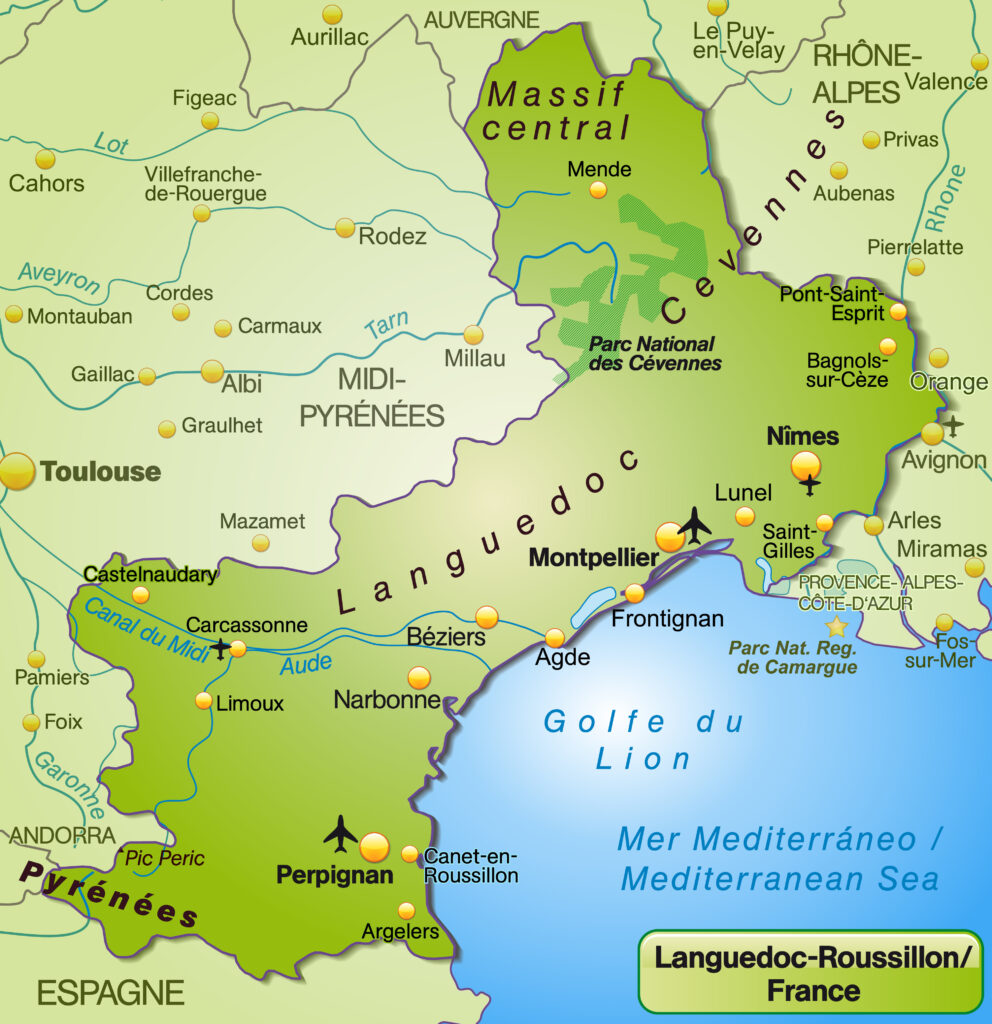A Dinner in Béziers?

Brigitte Bardot has affirmed her support for Éric Zemmour, the journalist/commentator who is flirting with a run for the presidency of France next year. Brigitte Bardot has also denounced the pass sanitaire (the proof of vaccination or negative test within 72 hours) imposed by Emmanuel Macron for entry into cafés, restaurants, trains, and other public spaces. She has compared the pass to the “ausweis,” the identity card imposed on Occupied France in World War II by the Nazis. She has suggested that the unvaccinated, denied “the possibility of living normally and freely,” respond by refusing to pay their taxes.
The person who will ultimately get her vote will be the one who is strongest on the issue of animal rights. (1)

Éric Zemmour is the featured commentator on CNews, a network which seems to have set its sights on becoming the Fox News of France. He is openly considering a run for the presidency in 2022–so openly that he is being included in the polling–and it is widely believed that the far right gadfly, as he is, will cut into the vote totals of Marine Le Pen, possibly even denying her a spot in the second round.
So what does Béziers have to do with all this?
Robert Ménard is the high-profile mayor of Béziers, elected in 2014 and easily re-elected in 2020. He is a self-described former “Trotskyite” and he was the founder of “Reporters without Borders.” Though he has never joined Le Pen’s Rassemblement National, he accepted its endorsement in both of his elections, and has declared that he will be supporting Marine Le Pen for the presidency.
Béziers, by the way, is a beautiful city of about 78,000, close to the Mediterranean Sea and the Spanish border. It is a conservative outpost in southwest France, which recently re-elected the Socialist Carole Delga as President of Occitanie, the région in which Béziers is located.

Ménard was the guest on Bourdin Direct, with Jean-Jacques Bourdin, on September 3, 2021. He stated that he was ready to accept Afghan refugees in his town, then qualified it: if they were not “true” refugees, in danger in their own country, they would have to leave; and he also wondered why the countries of the Middle East wouldn’t take them. He denounced Zemmour’s recent statement that Afghan refugees would have to choose between being Muslim and coming to France: “It’s not because you are Muslim that you are a problem, the problem is when you are an Islamist [politically radical], this isn’t the same thing.”
But Ménard was primarily on the show to talk about his new book, Chère Marine, described as a no-holds-barred, tough-talking admonition on what Marine Le Pen must do to win the presidency. The book is not out yet–apparently it will appear in mid-September–but some extracts from it appeared in the twitter feed of Jeremy Trottin, head political reporter at RMCInfo.
Ménard noted, for example, that Le Pen was correct to push back against the description of “extreme right,” leveled against her, because “your party [has never] contested the verdict of the ballot box, which is a major characteristic of this current of thought.”
Only extreme-right authoritarians, in other words, lie about the results of elections.
To continue:
He chided her for attacking the “pass sanitaire, a common sense measure” of Macron, a moment of “demagogy” that she had taken in order not to lose her far right followers. He urged her to “disengage” herself from the anti-masker, anti-vaxxer elements. What she needed to do, he suggested, was get rid of some of her entourage, the crazies who would drag her down. “I still remember,” he said, “the words of one of your close advisors (proches) speaking to me, some months from the elections of last June [regional and departmental], of a ‘prerevolutionary’ situation and of departments that would fall ‘into the bag’ of the RN . . . At this level of unreality, not to say imbecility, I was in complete shock (les bras m’en sont tombés). And this person affirmed that he had your ear. . . . (sic) I prefer not to believe this.”
Ménard was equally blunt about Zemmour, acknowledging that he has some “talent,” but “the passage from polemicist to politician, from ‘I have a television show’ to Head of State, I don’t believe Éric is capable of doing it.” His candidacy would, in fact, only serve to prevent Marine Le Pen from getting into the second round.
But it was after the show, perhaps in a burst of enthusiasm, that Ménard caused a problem as he sought to become peacemaker or kingmaker. Here, his tweet, and almost immediately the response of Zemmour.
But notice the difference. Ménard invited Le Pen and Zemmour to dinner, to gather around a table and talk. Zemmour said he would be happy to “debate” Le Pen.
Le Pen had to think about it for awhile, but finally acknowledged that she “had never refused to converse with whoever”; she clarified that her understanding of Ménard’s proposal was that it was a “dinner,” not a public debate. Then Zemmour’s entourage stipulated that the polémiciste had agreed to a debate, “not to back-kitchen nonsense,” (2). BFMTV, which had started all the chatter about the non-event, finally brought it to a close with “Érik Zemmour refuses the dinner with Marine Le Pen.
The tempest in a teapot, or scarcely that, was enough to occupy the media for a few days, but the non-story seemed to have two primary meanings.
First, and least importantly, Ménard learned first hand the danger of being spontaneous, though perhaps he meant to put himself at the center; he did, after all, write a pamphlet with instructions for what Le Pen has to do to win, and he went on the show to promote it–and clearly also, to promote his view of what the RN should be. And within Le Pen’s camp, there were some who believed that he had elevated Zemmour, to the irritation of her various spokesmen who found their appearances sidetracked by questions about Zemmour, as here, with Julien Odoul:
Second, and much more importantly, there is obviously some behind-the-scenes grumbling about Le Pen’s leadership. No one wants to see a repeat of her dreadful performance in the 2017 debate with Macron, where she lost on both substance and style, and yet most polls predict that the two will emerge from the first round as opponents in the second. And after priming the Régionales (June 21 and 28, 2021) as the opening salvo in the presidential election, Marine Le Pen saw the RN fail to take a single region, not even PACA (Provence-Alpes Maritimes-Côte d’Azur), the traditional stronghold of lepénisme.
An indication of how Le Pen planned to handle the defeats in the regionals was on display less than a week later. The Party Congress was held early in July, in Perpignan in Occitanie. At 122,000, Perpignan is the largest RN mayoralty in France; Louis Aliot, Le Pen’s former partner, hosted the gathering as the city’s newly-elected mayor. The Congress was supposed to celebrate their recent victories, which were non-existent; but Le Pen performed as if they had been victorious, with a 44-minute speech, perhaps the same she would have given if they had won. She confirmed the strategy of “dédiabolisation,” of “de-demonizing” the party, cleansing it of all traces of her father Jean-Marie (who is still alive and still openly critical of her), asserting that “We will not turn back. With all the respect that we [the RN] have for our own history, we will not return to the National Front [the original name]. The party had been consistently correct in its views: “We have seen clearly on immigration, on the [growing] savagery of society, on globalization and so many other subjects which have structured the political debate . . . [there is] a choice of society, better, of civilization, [between] a France that dares to name the enemy or one which gives up in the face of Islamism.” She denounced “uncontrolled immigration” that threatened “a possible submersion.” She swept past the recent elections and the threat of Zemmour.
She was reelected as head of the RN with 98.5% of the vote. (3)
There is a way in which Ménard’s pamphlet (what I have read of it from the tweet) meshes with her declaration during the Congress that they were not returning to the days of the National Front. What could that mean, particularly given that many have seen the name-change, from “Front” to “Rally,” as merely a cosmetic one?
Jean-Marie Le Pen, the long-time leader of the National Front, who had served in the military (even though he missed both Dien Bien Phu and Algeria) had attracted a number of old campaigners, Gaullists, paratroopers, Resistance fighters, who remembered the days of struggle as the best days of their lives. They were Frontistes because the party was potentially transgressive, a movement rather than a party; it threatened to “bring back” some essence of the nation that was in danger of being overrun by immigration, embourgeoisement, timidity. Make France Great Again.
Marine had domesticated the party. Her ambition was to make of the RN the alternative governing party of France. They would play by the rules. They would put forward a political platform. Their policies–populist and anti-immigrant as they were–would win at the ballot box, not by means of a frontal attack on the National Assembly (for example).
“In truth, dear Marine,” wrote Ménard, “you are at the crossroads. On the eve, perhaps, of becoming a woman of Destiny. You know perfectly well–you have said it to me and repeated it–that you cannot win a presidential election with your own forces. You know it so well that you are evolving, each day, toward positions more acceptable for the rest of the Right, this Right which, in spite of its desertions and betrayals once installed in power, is necessary to us if we want to carry the day. I’m not speaking of its leaders, who with some rare exceptions, will end by preferring a Macron–but of their voters. But for that, it is necessary that you rid yourself of the words and ideas which stick to you and mark you with the scarlet letter . . . (sic) of lepénisme.” (4)
How long will Ménard cling to his dreams of remaking the party?
Header Image by Shutterstock.
======================================================
(1) “2022: Brigitte Bardot tresse des lauriers à Éric Zemmour,” August 10, 2021. https://www.lepoint.fr/politique/2022-brigitte-bardot-tresse-des-lauriers-a-eric-zemmour-10-08-2021-2438399_20.php
(2) “Présidentielle: Zemmour et Le Pen d’accord pour une rencontre, Ménard s’en réjouit,” Le Point, September 3, 2021.https://www.lepoint.fr/politique/presidentielle-menard-propose-a-zemmour-et-le-pen-de-discuter-a-beziers-03-09-2021-2441348_20.php
(3) Thierry Bouldoire, “Congrès du RN à Perpignan. Marine Le Pen: ‘Nous ne reviendrons pas au Front national,’” L’indépendant, July 4, 2021.https://www.lindependant.fr/2021/07/04/congres-du-rn-a-perpignan-marine-le-pen-nous-ne-reviendrons-pas-au-front-national-9651027.php
Julien Marion, “Congrès du Rassemblement national à Perpignan: Louis Aliot rate la marche de la présidence,” L’Indépendant,” July 4, 2021.https://www.lindependant.fr/2021/07/04/congres-du-rassemblement-national-a-perpignan-louis-aliot-rate-la-marche-de-la-presidence-9650902.php
(4) Michael Esdourrubailh, “‘Chère Marine’: la lettre de Robert Ménard à Marine Le Pen pour gagner la présidentielle,” Midi Libre, September 3, 2021.https://www.midilibre.fr/2021/09/03/pourquoi-on-continue-a-faire-peur-la-lettre-de-robert-menard-a-marine-le-pen-pour-gagner-la-presidentielle-9766887.php